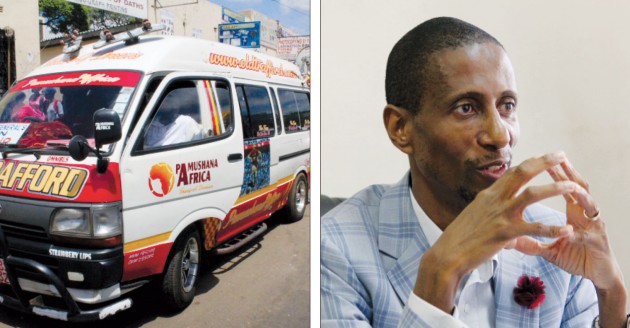Beating cash shortages . . .

This picture collage shows a Pamushana Africa kombi in which commuters can pay fares using swipe and the firm’s director Mr Hardlife Chipika
Leroy Dzenga Features Writer
These days in supermarkets and other places of trade, cash solicitors have become a close to permanent fixture. Some will be looking for amounts as little as $2 or less, with an aim to source hard cash to use for commuting back home after a day of work.
Most commuter omnibus operators have not adjusted their modus operandi even in the face of cash shortages.
They still demand their fares in physical money. Why they have maintained this inconveniencing stance is a mystery!
A local transport operator Pamushana Africa Transport, known by the moniker Old Trafford, plying the City to Warren Park route has been a deviation from the rest, introducing a multi-payment system for their passengers, with swipe facilities being the latest addition to the list.
The company’s director Mr Hardlife Chipika said they mooted the move in a bid to lessen the burden on their passengers.
“Our new strategy is our way of embracing the new dispensation as well as taking into account the June monetary policy, which called upon business entities to open up to digital payment platforms,” he said.
Because of their platform on social network WhatsApp through which they interface with their clients, Chipika said that they were inundated with calls to bring a helpful solution to the cash crisis.
“A lot of customers we interact with on our Pamushana Africa Whatsapp platforms are facing cash challenges and in cases where our staff is paid in cash, they are struggling for change because almost all our trips are just 50 cents,” he said.
A solution had to be formulated to ensure ease of transaction between the passengers and the transport operator, which is preferred by many who ply the Warren Park-City centre route.
“We then engaged a leading financial institution well versed in driving digital transformation in Zimbabwe, and they agreed to develop a mobile payment solution known as mobile point of sale (MPOS) targeting small to medium businesses, which have ticket sizes of value as little as 10 cents,” Chipika explained the dynamics behind the system impending introduction.
How does the system work?
The MPOS devices are like small cellphones but with a swipe tap and go function, which reduces delays associated with paying for services digitally, which has been the main source of criticism for plastic money.
“When commuters pay, they receive an electronic receipt via sms. This is a result of the function to punch in a cell number where the proof of payment will be sent. As the transaction is done, the money paid will credit the Pamushana Africa bank account,” said Chipika.
This model also increases accountability for businesses as there is traceable proof of transaction, which reduces pilferage and makes reconciliation of books relatively easier.
“The system will be a plus for the company as we get instant value, cash in transit costs are reduced and most importantly, revenue leakages will be minimised given that the commuter transport industry does not have audit trails in form of tickets,” Chipika outlined the benefits his business is set to enjoy once the system is running from today (January 8).
In the implementation of the idea, the operator is also guided by the standards within other blossoming transport systems in the region.
“We are eager to partner with financial service providers to ease and widen options for the commuting public.
“This mobile payment solution is a big step in the right direction and our wish is to have loyalty cards specifically for our passengers,” said Chipika.
These loyalty cards have been popularised in Zimbabwe by supermarkets such as OK who have their own cards where customers can load money for later transactions.
In South Africa, the luxury train operators have grasped this concept.
“Our plan in the near future is for our passengers to be able to load value into these cards for a week or month.
“This will make the trips more convenient for them, in the same way the Gautrain cards work in South Africa,” Chipika added.
Their regular passengers already enjoy prepayment privileges, it will just be moved into the plastic money method.
By mid-February, they could be experiencing more convenient service if the plans being mooted by Pamushana and their partnering financial institution materialise.
If their plan to introduce plastic money in kombis succeed, they will be setting a precedent in Southern Africa. In 2016, South Africa National Taxi Council (Santaco) tried to introduce swipe machines in commuter omnibuses but met resistance through security loopholes.
The questions which were raised were on the possibility of credit card theft which Pamushana Africa`s system seeks to address through faster tap and go mechanisms.
Small businesses and informal traders should take a leaf off the transport operator, if the grey areas in transacting, which require cash are addressed then bank queues may be cut short.
People will be insulated from searching for cash at a premium from the black market so they can make the next day at work, a prospect most Zimbabweans have been yearning for.
Feedback: [email protected]





Comments